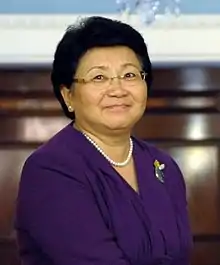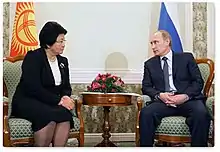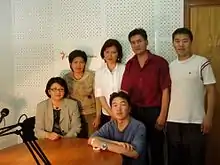Roza Otunbayeva
Roza Isakovna Otunbayeva (Kyrgyz: Роза Исаковна (Исак кызы) Отунбаева, Roza İsaqovna (İsaq qızı) Otunbayeva; born August 23, 1950) is a Kyrgyz diplomat and politician who served as the President of Kyrgyzstan from 7 April 2010 until 1 December 2011, becoming the first female Central Asian Head of State. She was sworn in on July 3, 2010, after acting as interim leader following the 2010 April revolution which led to the ousting of President Kurmanbek Bakiyev. She previously served as Minister of Foreign Affairs and as head of the parliamentary caucus for the Social Democratic Party of Kyrgyzstan.
Roza Otunbayeva Роза Отунбаева | |
|---|---|
 Roza in 2011 | |
| 3rd President of Kyrgyzstan | |
| In office 7 April 2010 – 1 December 2011 Acting: 7 April 2010 – 3 July 2010 | |
| Prime Minister | Almazbek Atambayev Omurbek Babanov (Acting) Almazbek Atambayev |
| Preceded by | Kurmanbek Bakiyev |
| Succeeded by | Almazbek Atambayev |
| Minister of Foreign Affairs | |
| In office 26 February 1992 – 10 October 1992 | |
| Prime Minister | Tursunbek Chyngyshev |
| Preceded by | Muratbek Imanaliyev |
| Succeeded by | Ednan Karabayev |
| Personal details | |
| Born | 23 August 1950 Frunze, Soviet Union (now Bishkek, Kyrgyzstan) |
| Political party | Social Democratic Party |
| Spouse(s) | Bolot Sadybakasov (divorced 1997) |
| Alma mater | Moscow State University |
Early life
Roza Otunbayeva was born in Osh, Kyrgyz SSR, USSR into the family of Isak Otunbayev, a member of the Supreme Court of Kyrgyz SSR (1967–1992), and Salika Daniyarova (1925–2020),[1] a teacher. She graduated from the Philosophy Faculty of Moscow State University in 1972 and went on to teach as Senior Teacher and then as Head of the Philosophy Department at Kyrgyz State National University for six years (1975–1981). In 1975 she became Candidate of Sciences after defending her dissertation, "Critique of falsification of Marxist-Leninist dialectic by the philosophers of Frankfurt school".[2] Roza Otunbayeva is a divorced mother of two children. She is fluent in Russian, English, German and French in addition to Kyrgyz. She can also understand a little Chinese.[3][4]
Political career
In 1981, she began her political career as the Communist Party's Second Secretary of the Lenin raion council (raikom) of Frunze (now Bishkek). From 1983 to 1986 Ms. Otunbayeva served as the Secretary of the City Communist Party Committee in Frunze (now Bishkek). In 1986 she was appointed the Deputy to the Chairman of the Council of Ministers, and the same time the Minister of Foreign Affairs of the Kirghiz Soviet Socialist Republic. In 1989 she was appointed as the Executive Secretary and later as the Chairwoman of the USSR UNESCO National Committee, and she also became member of the USSR Foreign Ministry's Board. In 1989–1992 she served as the Vice-President[5] of the UNESCO Executive Council. By 1992, the now independent Kyrgyzstan was led by Askar Akayev, who chose her to be Minister of Foreign Affairs and Deputy Prime Minister, positions she held until later that year when she became her country's first ambassador to the US and Canada (1992–1994). In May 1994 she was called back to her original post of Kyrgyz Minister of Foreign Affairs, remaining there for three years. From 1997 to 2002, she served as the first Kyrgyz ambassador to the United Kingdom of Great Britain and Northern Ireland. From 2002 to 2004, she was recruited Deputy Special Representative of the UN Secretary General in the Peacekeeping Mission for Georgia.[6] Upon her return to Kyrgyzstan in late 2004, Otunbayeva became politically active. In December 2004, she and three other opposition parliamentarians founded the Ata-Jurt (Fatherland) public movement in preparation for the February 2005 parliamentary elections.[7]
From March to September 2005 Ms. Otunbayeva served as Acting Minister of Foreign Affairs.
"Tulip Revolution"
Otunbayeva was one of the key leaders of the Tulip Revolution in Kyrgyzstan which led to the overthrow of President Akayev.[8] Subsequently, she served for a few months as Acting Foreign Minister in the interim government of then prime minister (and acting president) Kurmanbek Bakiyev. After Bakiyev was elected President and Feliks Kulov became Prime Minister, Otunbayeva failed to receive the required parliamentary support to become Foreign Minister.[7] She then ran unsuccessfully in a parliamentary by-election a few months later. Otunbayeva played a key role in the November 2006 protests that pressed successfully for a new democratic constitution.
She was the co-chairwoman of the country's Asaba[9] (Flag) National Revival Party for a short time. In December 2007, Otunbayeva was elected to the Jogorku Kenesh – the Parliament of Kyrgyzstan – on the list of the Social Democratic Party of Kyrgyzstan. She served as the Leader of the Opposition SDP from 2008 to 2010. In 2009 she became the Leader of People's Front opposition.
2010 uprising and presidency
On April 7, 2010, Otunbayeva was chosen by opposition leaders as head of the Interim Government of the Kyrgyz Republic, following widespread rioting in Bishkek and the ouster of President Kurmanbek Bakiyev.[10]


Bakiyev fled the Jalal-Abad area as the riots became more violent. Unable to rally support, he resigned as president on April 10, 2010, and left the country for Kazakhstan. Nine days later he went to Minsk, Belarus, where he was given protected-exile status. On April 21 he recanted his resignation and declared that he was still president of Kyrgyzstan. Otunbayeva vowed to bring him to trial.[11]
As interim president, Otunbayeva had four male deputies. Otunbayeva is considered to be unusual as there are few women in politics in Kyrgyzstan. Her first conversation after she came to power was with Russian Prime Minister Vladimir Putin. Otunbayeva declared that new elections would be called within six months and that she would act as president until then.[12]
With violent protests in support of ousted President Kurmanbek Bakiyev continuing in Jalalabad, the home city of the former president, it was announced on May 19, 2010, by the interim government that elections would be delayed until 2011 and Otunbayeva was named as president. Following a referendum on the new Kyrgyz constitution, she was sworn in on July 3, 2010. Otunbayeva however was prohibited by the new constitution from running in the 2011 presidential election and her term ended on December 31, 2011.[13][14] The referendum was supported by over 90% and changes the government from a Presidential republic to a Parliamentary republic. Parliamentary elections were held in October and the new parliament elected the Prime Minister and Cabinet.[15][16]
Post-Presidency
In January 2012 Roza Otunbayeva has established the International Public Foundation "Roza Otunbayeva Initiative".[17] The main objective of the Foundation is to implement programs and projects that will contribute to the social, political and economic development of the Kyrgyz Republic. During a 2016 speech by her successor at a military parade on Ala-Too Square for the 25th anniversary of Kyrgyzstan's independence, Otunbayeva walked off the stage after President Atamabayev repeatedly criticized her government.[18] During a speech by Otunbayeva at the Middlebury Institute of International Studies in May 2018, she claimed that the young Kyrgyz generation values freedom above all, saying that they "have been infected by freedom and it runs deep".[19]
Honours and awards
Roza Otunbayeva was listed as one of the 150 Most Influential Women in the World by Newsweek/Daily Beast 2011 Edition.
Otunbayeva has received France's "Legion of Honour" Award with the degree of Commander, as well as the highest order of Mongolia's "Polar Star" Award. She was awarded the Premio Minerva Medallion, which is presided over by the President of the Italian Republic, "For occupying the highest institutional role in Kyrgyzstan, and for her international activities promoting democracy and peace".
In 2011, Otunbayeva received an International Women of Courage Award, which is presented annually by the United States Department of State to women around the world who have shown leadership, courage, resourcefulness, and the willingness to sacrifice for others, especially while promoting women's rights. On December 13, 2012, the Eurasia Foundation (USA) awarded her with the 2012 Bill Maynes Award for demonstrating visionary leadership throughout Kyrgyzstan's constitutional transition and providing a lifelong example of public service.

Otunbayeva is a member of:
- Club de Madrid (Madrid)
- Governing Board of the Interstate Foundation of Humanitarian Cooperation of the Commonwealth of Independent States (CIS) (Moscow)
- Leadership Council of the Sustainable Development Solutions Network, a Global Initiative of the United Nations (New York)
- Board of the UN University for Peace (UPEACE) in Costa Rica
- Board of the UNESCO Mahatma Gandhi Institute of Education for Peace and Sustainable Development (New Delhi)
- IOM Migration Advisory Board (Geneva)
She is an Honorary Professor at the:
- Shanghai University of Political Science and Law (China)
- Honorary Professor at the Ganjavi University (Azerbaijan)
She is also an Honorary Professor at:
- I. Razzakov Kyrgyz State Technical University
- B. Beishenalieva Kyrgyz State Arts and Culture University
- K. Tynystanov Issyk-Kul State University
- J. Balasagyn Kyrgyz National University
- K. Moldobasanova Kyrgyz National Conservatory
- MVD Academy of Kyrgyzstan
- Jalal-Abad State University
- K. Karasaev Bishkek Humanities University
- S. Naamatov Naryn State University
See also
- 2010 Kyrgyzstani uprising
- List of elected and appointed female heads of state
References
| Wikimedia Commons has media related to Roza Otunbayeva. |
- https://kaktus.media/doc/416057_ymerla_mat_eks_prezidenta_rozy_otynbaevoy_salika_daniiarova.html
- "2007 Report" (PDF) (in Russian). Knyazev.org. Archived from the original (PDF) on 2012-03-08. Retrieved 2012-10-08.
- © РИА Новости. Руслан Кривобок (8 April 2010). "Роза Исааковна Отунбаева. Биографическая справка | Справки | Лента новостей "РИА Новости"". RIA Novosti. Retrieved 2012-10-08.
- Osborn, Andrew (8 April 2010). "Roza Otunbayeva, the head of Kyrgyzstan's new interim government, is not an archetypal revolutionary". Telegraph. Retrieved 9 April 2010.
- "Roza Otunbayeva". www.worldleaders.columbia.edu. Retrieved 2015-12-22.
- "SECRETARY-GENERAL APPOINTS HEIDI TAGLIAVINI OF SWITZERLAND AS SPECIAL REPRESENTATIVE FOR GEORGIA, HEAD OF UNOMIG | Meetings Coverage and Press Releases". www.un.org. Retrieved 2015-12-22.
- "Profile: Roza Otunbayeva". BBC. 8 April 2010. Retrieved 9 April 2010.
- Archived September 27, 2007, at the Wayback Machine
- "Kyrgyzstan - Political Parties". www.globalsecurity.org. Retrieved 2015-12-22.
- "Opposition Forces In Kyrgyzstan Claim Power, Form Interim Government". Rferl.org. Retrieved 2012-10-08.
- "Kyrgyzstan opposition declares new government". BBC News. 2010-04-08. Retrieved 2012-10-08.
- Osborn, Andrew (8 April 2010). "Kyrgyzstan riots: opposition forms interim government after deadly revolt". Telegraph.co.uk. Retrieved 9 April 2010.
- "Kyrgyzstan's interim leader named president until end of 2011". Xinhua. 2010-05-20. Archived from the original on 2010-05-20. Retrieved 2010-05-20.
- msk, 8 october 2012. "Kyrgyzstan: Roza Otunbaeva is appointed as the president until the end of 2011 without right for reelection - Ferghana Information agency, Moscow". Enews.ferghana.ru. Archived from the original on 2012-07-16. Retrieved 2012-10-08.
- "About Rissho Kosei-kai, a Buddhist organization". Rk-world.org. Retrieved 2012-10-08.
- "eng.24.kg". eng.24.kg. Archived from the original on 2011-09-30. Retrieved 2012-10-08.
- "МОФ "Инициатива Розы Отунбаевой" »..." roza.kg. Retrieved 2015-12-22.
- https://thediplomat.com/2016/09/independence-day-in-kyrgyzstan-marred-by-tragedy-terror-and-politicking/
- https://www.middlebury.edu/institute/academics/centers-initiatives/graduate-initiative-russian-studies/girs-news/former-kyrgyz-president
External links
| Wikiquote has quotations related to: Roza Otunbayeva |
| Wikimedia Commons has media related to Roza Otunbayeva. |
- Kyrgyzstan: The Bittersweet Fruits Of The Revolution
- Roza Otunbayeva interviews on Echo of Moscow (in Russian)
| Political offices | ||
|---|---|---|
| Preceded by Muratbek Imanaliyev |
Minister of Foreign Affairs 1992 |
Succeeded by Ednan Karabayev |
| Preceded by Kurmanbek Bakiyev |
President of Kyrgyzstan 2010–2011 |
Succeeded by Almazbek Atambayev |